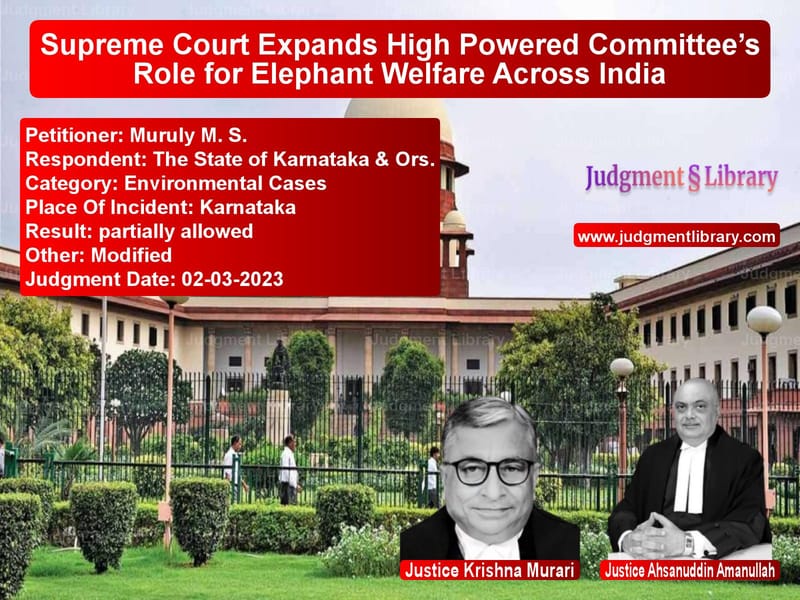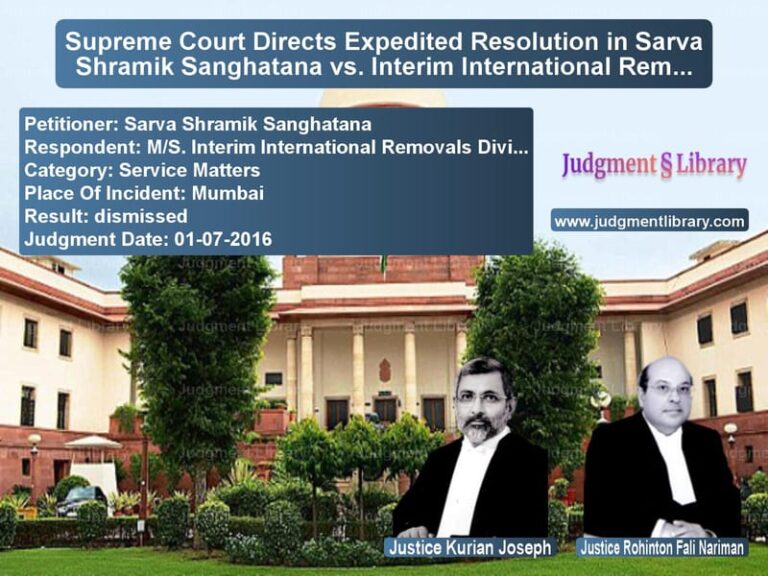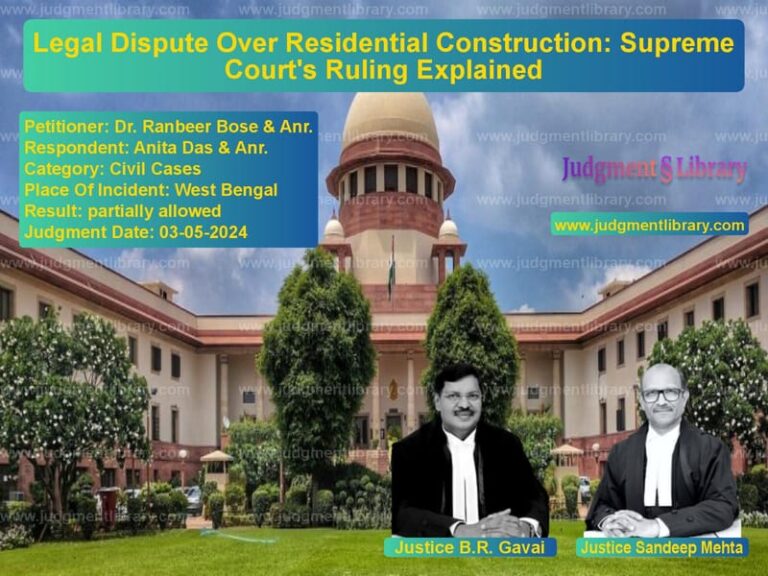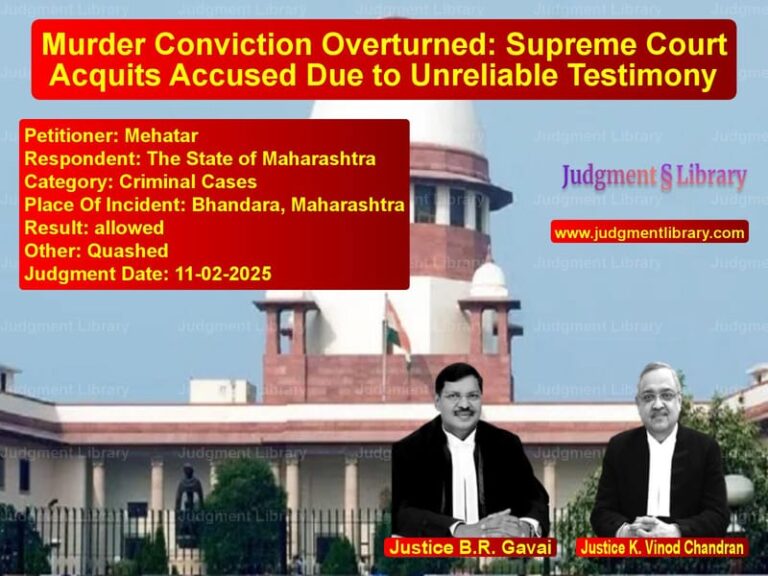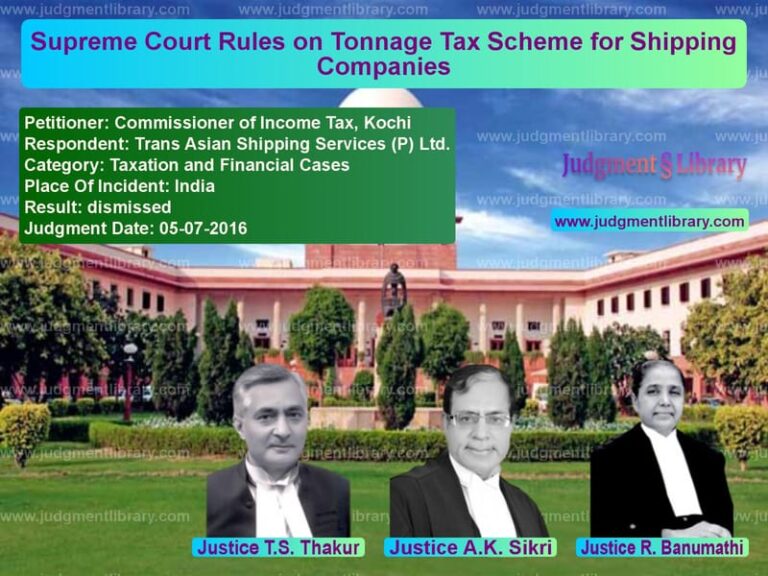Supreme Court Expands High Powered Committee’s Role for Elephant Welfare Across India
The Supreme Court of India recently ruled on an important matter concerning the welfare and transfer of wild and captive elephants across the country. This decision came in response to a miscellaneous application filed by Muruly M. S., a Public Interest Litigation (PIL) petitioner, seeking clarification of a previous order regarding the transfer of elephants within Karnataka. The case, which initially concerned the state of Karnataka, led to the extension of a High Powered Committee’s (HPC) jurisdiction to a national level for the better care and rehabilitation of elephants.
Background of the Case
The PIL petitioner originally approached the Karnataka High Court, seeking restrictions on the transfer, sale, or gifting of wild and captive elephants to private entities, particularly the Radha Krishna Temple Elephant Welfare Trust. The Karnataka High Court dismissed the PIL, after which the petitioner filed a Special Leave Petition (SLP) before the Supreme Court. The Supreme Court also dismissed the SLP on August 1, 2022.
Through a miscellaneous application, the petitioner sought a clarification that the Supreme Court’s previous order was applicable only to elephants within Karnataka and not to other states. This request was strongly opposed by the respondent, Radha Krishna Temple Elephant Welfare Trust.
Arguments by the Petitioner
The petitioner contended:
- The Supreme Court’s prior decision was being misinterpreted as having a nationwide effect.
- The Karnataka High Court’s dismissal of the PIL should not be used as a precedent for other states.
- There was a need for clear judicial clarification to ensure uniformity in the treatment and transfer of elephants.
Arguments by the Respondent
The respondent, Radha Krishna Temple Elephant Welfare Trust, argued:
- The trust is a registered public charitable trust that promotes the welfare of animals.
- It does not receive government funds and does not generate profit from the elephants under its care.
- The trust provides long-term care for elephants rescued from abusive captivity, such as circuses and street begging.
- The trust does not function as a breeding center and does not engage in any commercial activities involving the elephants.
- Numerous frivolous PILs have been filed in various courts, disrupting the trust’s operations and wasting judicial resources.
Supreme Court’s Observations and Decision
The Supreme Court, while rejecting the petitioner’s request for clarification, went a step further by extending the jurisdiction of the High Powered Committee (HPC) to oversee the welfare, care, and rehabilitation of elephants at a national level. The Court made the following key observations:
- Multiple PILs challenging the transfer of elephants had been dismissed by different High Courts, indicating a pattern of unnecessary litigation.
- The High Court of Tripura had earlier constituted the HPC to oversee elephant transfers from Northeast India, headed by retired Supreme Court Justice Deepak Verma.
- Given the importance of elephant welfare, the HPC’s jurisdiction should be extended to cover all of India, rather than being limited to a single region.
Key Directions Issued by the Supreme Court
The Supreme Court issued the following directives to ensure the well-being of elephants across India:
- Expansion of the High Powered Committee’s Role: The jurisdiction of the High Powered Committee, originally limited to Northeast India, is now extended nationwide.
- Inclusion of State Wildlife Wardens: The Chief Wildlife Wardens of the respective states will be co-opted into the committee whenever a case pertains to their jurisdiction.
- Supervision of Elephant Transfers: The HPC is empowered to conduct necessary checks and fact-finding inquiries into any complaints related to elephant transfers or welfare.
- Approval of Elephant Transfers: The committee has the authority to evaluate and approve requests for the transfer, import, or welfare of elephants in rehabilitation centers or zoos.
- Reporting and Seizure Guidelines: All state and central authorities must report any seizure or abandonment of wild or captive elephants to the HPC for appropriate action.
- Rehabilitation Measures: The committee may recommend the transfer of ownership of captive or seized wild elephants to suitable rescue centers or zoos.
- Financial Support: The HPC chairman has the authority to determine the honorarium and operational expenses, which shall be borne by the respective state or central government.
Impact of the Judgment
The Supreme Court’s decision has far-reaching implications for wildlife conservation and elephant welfare in India. By extending the jurisdiction of the High Powered Committee nationwide, the Court has taken a significant step toward preventing the exploitation and mistreatment of elephants.
The ruling ensures that any issues regarding the transfer, care, or rehabilitation of elephants are handled by a specialized committee with expert guidance. Furthermore, it helps curb unnecessary litigation and provides a structured approach to addressing concerns related to elephant welfare.
Conclusion
The Supreme Court’s judgment reinforces India’s commitment to wildlife conservation and animal welfare. By centralizing the decision-making process under the High Powered Committee, the Court has created a mechanism to ensure better regulation of elephant transfers and their long-term care.
This landmark ruling not only addresses the immediate concerns of the case but also sets a precedent for future wildlife protection initiatives. The decision underscores the importance of structured and expert-led oversight in managing the delicate balance between human-animal coexistence and conservation efforts.
Petitioner Name: Muruly M. S..Respondent Name: The State of Karnataka & Ors..Judgment By: Justice Krishna Murari, Justice Ahsanuddin Amanullah.Place Of Incident: Karnataka.Judgment Date: 02-03-2023.
Don’t miss out on the full details! Download the complete judgment in PDF format below and gain valuable insights instantly!
Download Judgment: muruly-m.-s.-vs-the-state-of-karnata-supreme-court-of-india-judgment-dated-02-03-2023.pdf
Directly Download Judgment: Directly download this Judgment
See all petitions in Environmental Cases
See all petitions in Judgment by Krishna Murari
See all petitions in Judgment by Ahsanuddin Amanullah
See all petitions in partially allowed
See all petitions in Modified
See all petitions in supreme court of India judgments March 2023
See all petitions in 2023 judgments
See all posts in Environmental Cases Category
See all allowed petitions in Environmental Cases Category
See all Dismissed petitions in Environmental Cases Category
See all partially allowed petitions in Environmental Cases Category

